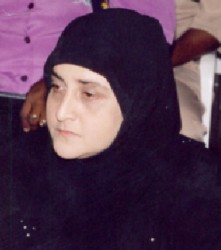Director of Public Prosecutions (DPP) Shalimar Ali-Hack says her office is seeing more requests for advice on cases from police but there is still a long way to go.
Ali-Hack, who had written acting Police Commissioner Leroy Brumell in January berating the force over poor investigations and the long delay in getting important files to her office, maintains that it is wise for the police to seek advice before instituting a charge, while saying this is particularly true as it relates to serious crimes, such as murder, manslaughter, armed robbery and drug trafficking, particularly where large quantities were involved.

“Too often I have noted that lengthy delays in obtaining advice in many cases have resulted in crucial investigations not being done by the police, which results in the lack of important evidence required to establish the offence,” she told Stabroek News.
Ali-Hack said that it was for this reason that she proposed to the commissioner that upon receipt of the report of a crime at a given police station, especially in serious cases, files should be brought to her chambers for legal advice within 72 hours. “To do otherwise, as obtains very often, would be to jeopardize the investigations and lose strong evidential value,” she said.
A recent black eye for the police force’s handling of a serious case was the decision to charge suspect Shaka Chase with the murder of police corporal Romein Cleto. Police instituted the charge without advice from the DPP, who later reviewed the evidence and advised that the charge be withdrawn. The DPP later said that the evidence was “insufficient” to properly identify the shooter and/or his accomplices.
Ali-Hack said the letter to Brumell “must not be seen as castigating the police force or an indictment of them; rather it should be viewed as a wake-up call for them to become more proactive and resilient in their quest to solve crimes in our country.”
In the strongly-worded letter, she had informed that she was alarmed at the police’s investigation of serious crimes, including murder, in which obvious clues were overlooked.
The DPP had noted that the actions of the police were impacting on the effective functioning of her chambers and she complained that requests by her office for case files were either not acted upon or were followed by long delays. In one instance, it took 34 months for the case file to be sent to her office and when it was reviewed there was evidence of a double murder and not murder/suicide as the police were suggesting. “It is evident from the post mortem examination reports that this was a double murder, but due to poor police investigations no person has been charged and this double murder remains unsolved,” she had stated.
Ali-Hack’s said that all the murders in ‘D’ Division for last year remained unsolved, including the triple murder of Jennifer Persaud and her two children, Jadon and Afridi, at Anna Catherina, which occurred between September 22 and September 23, 2012, and the October, 2012 murder of Muneer Hussain, a 77-year-old Canada-based Guyanese, and she said this showed evidence of poor police investigations.
In giving Stabroek News an update some of the cases highlighted in her letter, Ali-Hack said that the files for several cases had been sent back for further investigations and were still outstanding, while some were never received.
According to her, “while there has been an improvement by the police in sending files to the DPP’s chambers for legal advice, there is much room for improvement to reach an acceptable level… [although] with a sustained effort this can be achieved.” She said too that despite the files being received at the chambers, in some instances the advice to institute charges could not be given because the investigations were still in their initial stages.










